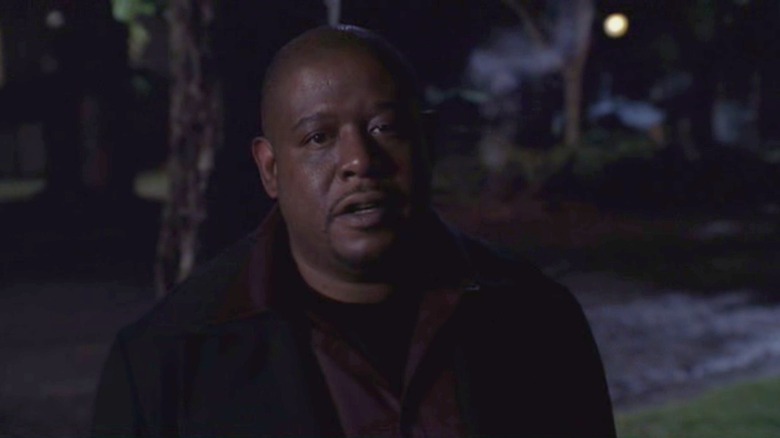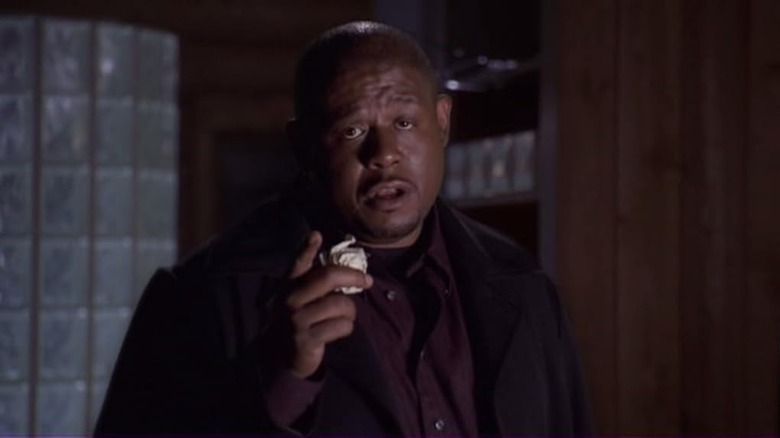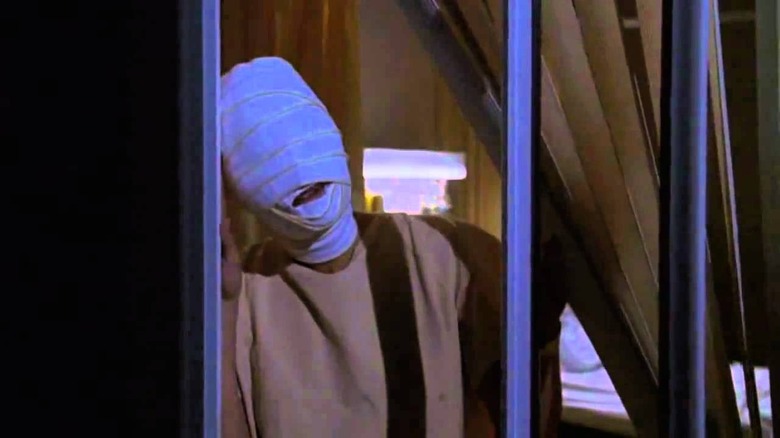The Twilight Zone's 2002 Revival Was Doomed From The Start, Thanks To Network Interference
As of this writing, there have been four TV versions of "The Twilight Zone." There was Rod Serling's original series which ran from 1959 until 1964, of course, and that series completely shook the pop culture landscape, becoming a new pivot point by which new shows would be measured. In 1985, a decade after Serling's death, "The Twilight Zone" was revived and tried to adhere to the spirit of the original series by adapting stories from experienced sci-fi writers and employing an interesting raft of known actors and directors. Wes Craven, Tommy Lee Wallace, William Friedkin, Joe Dante, John Milius, Martha Coolidge, Bill Duke, and Atom Egoyan helmed episodes.
Many may also recall, merely through recency bias, that there was a 2019 "Twilight Zone" revival produced by Jordan Peele and broadcast on CBS All Access (now Paramount+). That new version has already been canceled after two ten-episode seasons.
Less well-remembered may be the early '00s UPN version of "The Twilight Zone" hosted by Forrest Whitaker. That series only lasted a single season, running from September 2002 until May 2003, turning out 43 episodes. One of the series' show-runners was Ira Steven Behr, who had recently had a successful run with "Star Trek: Deep Space Nine," and he brought in a few Trek luminaries to work on the new "Zone," including Jonathan Frakes and Winrich Kolbe.
It seems that the UPN — the failed Paramount network that is often held up as a bastion of good decision-making — gave the showrunners of the 2002 "Zone" myriad terrible notes and mandates that they couldn't possibly have followed. Behr recalled his "Zone" experience in a 2022 interview with SyFy, and had nothing positive to say about the higher-ups and their ideas. He compared them to a certain part of the human anatomy.
It was like a talking a**hole.
The central error of the Paramount executives overseeing the 2002 version of "The Twilight Zone" was that they wanted to make the show "hip." This is a fundamental error, as "The Twilight Zone" always gained its traction in being intelligent, cerebral, and — like its uncanny hosts — stoic. People tuned into "The Twilight Zone" because it offered them speculative sci-fi or fantastical morality plays, not because it was sexy. Behr, naturally, hated the studio's attempts at hipness. He said:
"All they wanted us to do was cast rappers and other people whose acting experience was ... let's just say limited. [...] Sometimes it worked, sometimes it did not work. And they got into this crazy-ass kick on making the show seem relevant. But since they were neither young nor relevant, it was like a talking a**hole."
The only rapper to ultimately appear on the 2002 "Zone" was Usher.
It didn't help matters that Behr was keen on pushing the envelope. One of the first episodes that he intended to film was a tale of a genetically enhanced unborn fetus that had the ability to kill its mother and father. Sadly for Behr, that story was never given the rubber stamp. The studio wanted something hip, but also safe. Behr wanted something further out on the edge, something to really provoke audiences. That initially bad start left a sour taste in everyone's mouths for the rest of the series. Behr said:
"The response was, 'No! We're not doing that episode. It makes us uneasy.' It's the f***ing 'Twilight Zone,' it's supposed to make you uneasy. [...] And from there on, it became a bit of a hell to get stories past that were 'Twilight Zone'-specific according to them."
Are you ****ing kidding me?
The show ran 43 episodes, which was a lot to compact into a single season. Behr recalls that the turnaround on episodes was faster than anything he had worked on before. To make matters worse, all the executives wanted a hand in story approval, making for a traffic jam of ideas. Writers' stories were discarded at the last minute, and all the usual showbiz B.S. took its place. The entire experience was a matter of re-writing the terrible scripts that the studio wanted. Behr was displeased, to say the least. He recalled one script in particular that came from a friend or relative of an exec. Naturally, it sucked. Behr recalls:
"[T]hey were throwing out stories left and right, [and] you're trying to find time to produce a show and produce scripts. Anthologies do not need all those chefs. [...] We read the script and it's like, 'Are you f***ing kidding me? This is not good.' So we wound up spending all night trying to fix [it] because we [knew we] would have to shoot it. That's how it went [over] 40 episodes."
Add to that the insistence that Behr remake several classic "Twilight Zone" episodes — something he definitely didn't want to do — and you have a legitimate fiasco. Despite it all, the writers all knew that many hit shows start badly and they were all willing to come back for a second season. "In spite of all the s*** that went down," Behr said, "it was like, 'Nope, we survived it. The second season might get better. Maybe they'll leave us alone."
No one had a chance to find out. "The Twilight Zone" was canned.
22 episodes of the 2002 series can currently be seen on Tubi.


